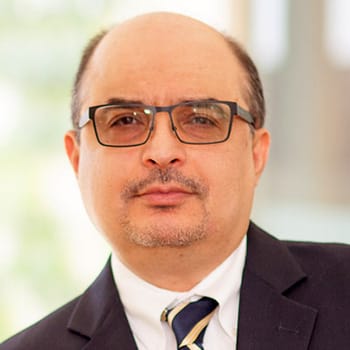Program Director

Alireza Sadeghian PhD
Professor, Department of Computer Science, Faculty of Science, Toronto Metropolitan University;
Chair, IEEE Signals & Computational Intelligence Chapter, Toronto Section
Affiliate Scientist, Li Ka Shing Knowledge Institute, Keenan Research Centre, St. Michael’s Hospital
Founding Director, Advanced Artificial Intelligence Lab (AI2)
Dr. Alireza Sadeghian has been with the Department of Computer Science at Toronto Metropolitan University since 1999, where he holds the position of the Professor, and he was the Founding Chair of the Department of Computer Science from 2005 to 2015. Dr. Sadeghian has extensive expertise in the areas of Artificial Intelligence, Machine Learning, Deep Learning, and modeling of complex dynamical systems particularly related to medical and industrial applications. He is also the founding Director of the Advanced Artificial Intelligence Lab (AI)2, Computational Intelligence Initiative (CI2) and Ubiquitous and Pervasive Computing Laboratories (UPCL), and. Dr. Sadeghian has supervised and trained 12 postdoctoral fellows, 13 PhD, and 30 Master’s students, as well as 68 research assistants. He has published over 150 journal manuscripts, refereed conference papers, and book chapters, as well as two edited books. He has also filed 2 invention disclosures and 2 patents.
Dr. Sadeghian has been actively involved with a number of international professional and academic boards. His past activities include IEEE Education Activity Board; Chair of IEEE Toronto Section, Technical Society Chapter, Magnetics; and NAFIPS Board (North American Fuzzy Information Processing Society). Presently, he is the Vice-Chair of the IEEE Computational Intelligence, Standards Committee, Chair of IEEE Computational Intelligence Technical Society Chapter, Toronto Section, a member of the IEEE Standard Associations – Standards Development for the Computational Intelligence Society Standards Committee, XAI – eXplainable AI Working Group, IEEE P2976 Working Group.
Dr. Sadeghian is also on the Editorial Board of Applied Soft Computing Journal and serves as an Associate Editor of IEEE Access, Information Sciences, and Expert Systems Journal. He has served on over 80 conferences as Honorary Chair/General Chair/Organizer/Technical/Track Program Committee member, and has been a reviewer of many granting bodies including NSERC, MITACS, OCE, CFI, PRECARN, and PREA.
Scientific Planning Committee
Michael Cusimano MD, FRCSC, DABNS, FACS, PhD, MHPE
Professor, Neurosurgery, Department of Surgery, Temerty Faculty of Medicine, University of Toronto
Shahin Hatami MD
Family Physician
Alexander Landry BSc
Resident, Department of Surgery, Temerty Faculty of Medicine, University of Toronto
Alireza Sadeghian PhD
Professor, Department of Computer Science, Faculty of Science, Toronto Metropolitan University;
Chair, IEEE Signals & Computational Intelligence Chapter, Toronto Section
Affiliate Scientist, Li Ka Shing Knowledge Institute, Keenan Research Centre, St. Michael’s Hospital
Founding Director, Advanced Artificial Intelligence Lab (AI2)
Suzan Schneeweiss MD, MEd, FRCPC
Professor of Paediatrics
Associate Dean, Continuing Professional Development, Temerty Faculty of Medicine, University of Toronto
Director of Education and Staff Emergency Paediatrician, Division of Paediatric Emergency Medicine, The Hospital for Sick Children
Devin Singh MBBS, MSc (Computer Science)
Staff Physician, Lead Clinical AI and Machine Learning in PEM at The Hospital for Sick Children;
Co-Founder & CEO Hero AI
David Wiljer PhD
Academic Director, Continuing Professional Development, Temerty Faculty of Medicine, University of Toronto;
Scientist, The Wilson Centre;
Executive Director, Education Technology and Innovation, University Health Network;
Professor, Institute of Health Policy, Management and Evaluation, Dalla Lana School of Public Health, and Department of Psychiatry, University of Toronto
Faculty Disclosure
It is the policy of University of Toronto, Faculty of Medicine, Continuing Professional Development to ensure balance, independence, objectivity, and scientific rigor in all its individually accredited or jointly accredited educational programs. Speakers and/or planning committee members, participating in University of Toronto accredited programs, are expected to disclose to the program audience any real or apparent conflict(s) of interest that may have a direct bearing on the subject matter of the continuing education program. This pertains to relationships within the last five (5) years with pharmaceutical companies, biomedical device manufacturers, or other corporations whose products or services are related to the subject matter of the presentation topic. The intent of this policy is not to prevent a speaker with a potential conflict of interest from making a presentation. It is merely intended that any potential conflict should be identified openly so that the listeners may form their own judgments about the presentation with the full disclosure of facts. It remains for the audience to determine whether the speaker’s outside interests may reflect a possible bias in either the exposition or the conclusions presented.